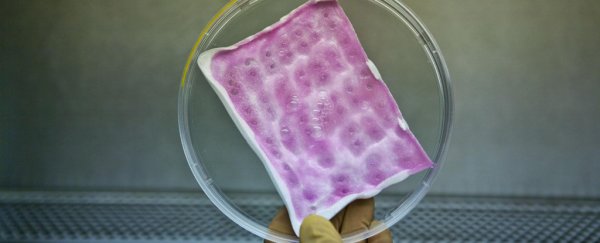Scientists in Switzerland have developed an infection-fighting bandage that could help prevent burn victims from succumbing to the bacteria breeding in their wound dressings.
Advancements in intensive care mean that patients with serious burn trauma today stand the best possible chance of recovering from incidents involving fire and heat. But the same can't be said for post-trauma recovery – when immunocompromised patients are especially susceptible to infection.
During convalescence, burn patients might be missing skin on parts of their bodies and wear bandages to treat their injuries. While these dressings may help heal burn wounds, like other cloth-based materials, they're also ideal breeding grounds for bacteria.
It's a significant problem, since, according to the researchers, death from post-burn infections is more common than fatalities from the burns alone. This is especially so with Pseudomonas aeruginosa, the main cause of bacterial infection among patients with serious burns.
This is where the new biological bandage comes in. Designed to accelerate the scarring process, the dressing aims to ultimately keep bacteria from multiplying, which could help head off infections before they take hold.
"Currently, we have to take enormous precautions with our patients," said Lee Ann Laurent-Applegate, head of the Regenerative Therapy Unit at Lausanne University Hospital. "The bandages, which sometimes cover most parts of the body, need to be changed every day for several months. Yet that does not stop infections. And we cannot prescribe antibiotics to all patients as a preventive measure for fear of making the bacteria more resistant."
The technology is based on a biodegradable bandage first developed by the researchers in 2005. Made from animal collagen and progenitor cells, this forerunner bandage sped up healing but didn't do anything to protect against microbes.
What the researchers have done now is combine the bandage with molecules called dendrimers. When the gauze is applied to a bacteria-infected site on a patient's skin, some of the dendrimers migrate to the skin and destroy the microbes in the vicinity, while others stay behind as a kind of rear guard.
"Bandages are a favourable environment for bacterial growth," said one of the team, Dominique Pioletti from École Polytechnique Fédérale de Lausanne. "So some dendrimers have to remain in the bandage to destroy any intruders."
While it's a promising technology, the bandage – which is described in detail in Scientific Reports – isn't ready for use in hospitals yet. The researchers say further testing with the dressing will be conducted in Zurich, and only then will it be used in clinics. But if everything goes as planned, this could turn out to be a huge aid to vulnerable patients recovering from burn trauma.
"With the new bandages, rather than treating infections, we will be preventing them," said Laurent-Applegate. "We are nipping the problem in the bud."
